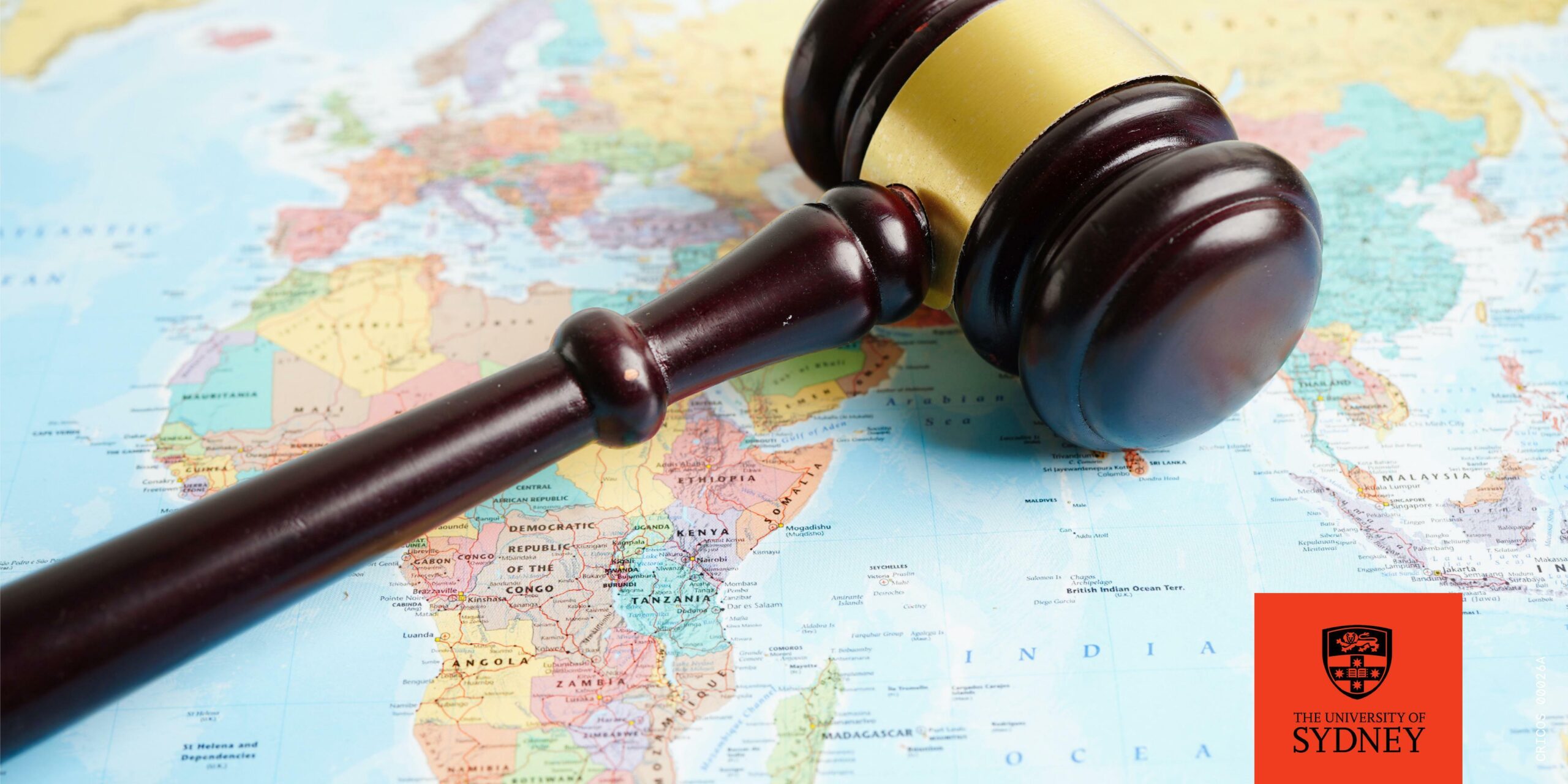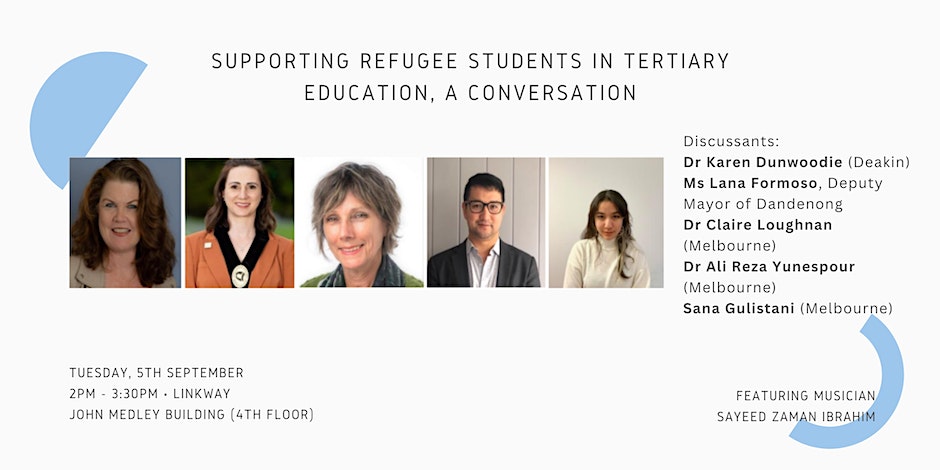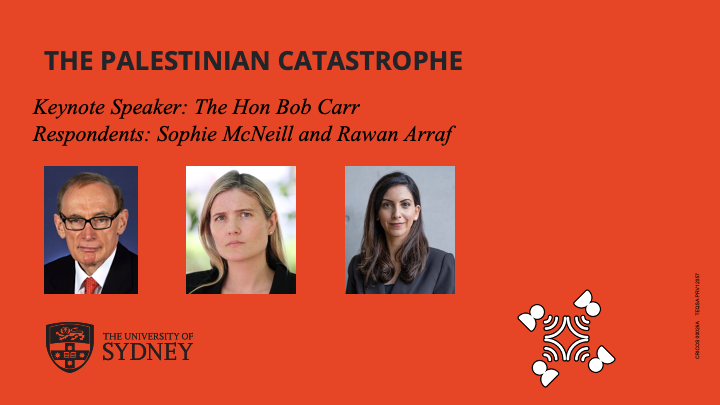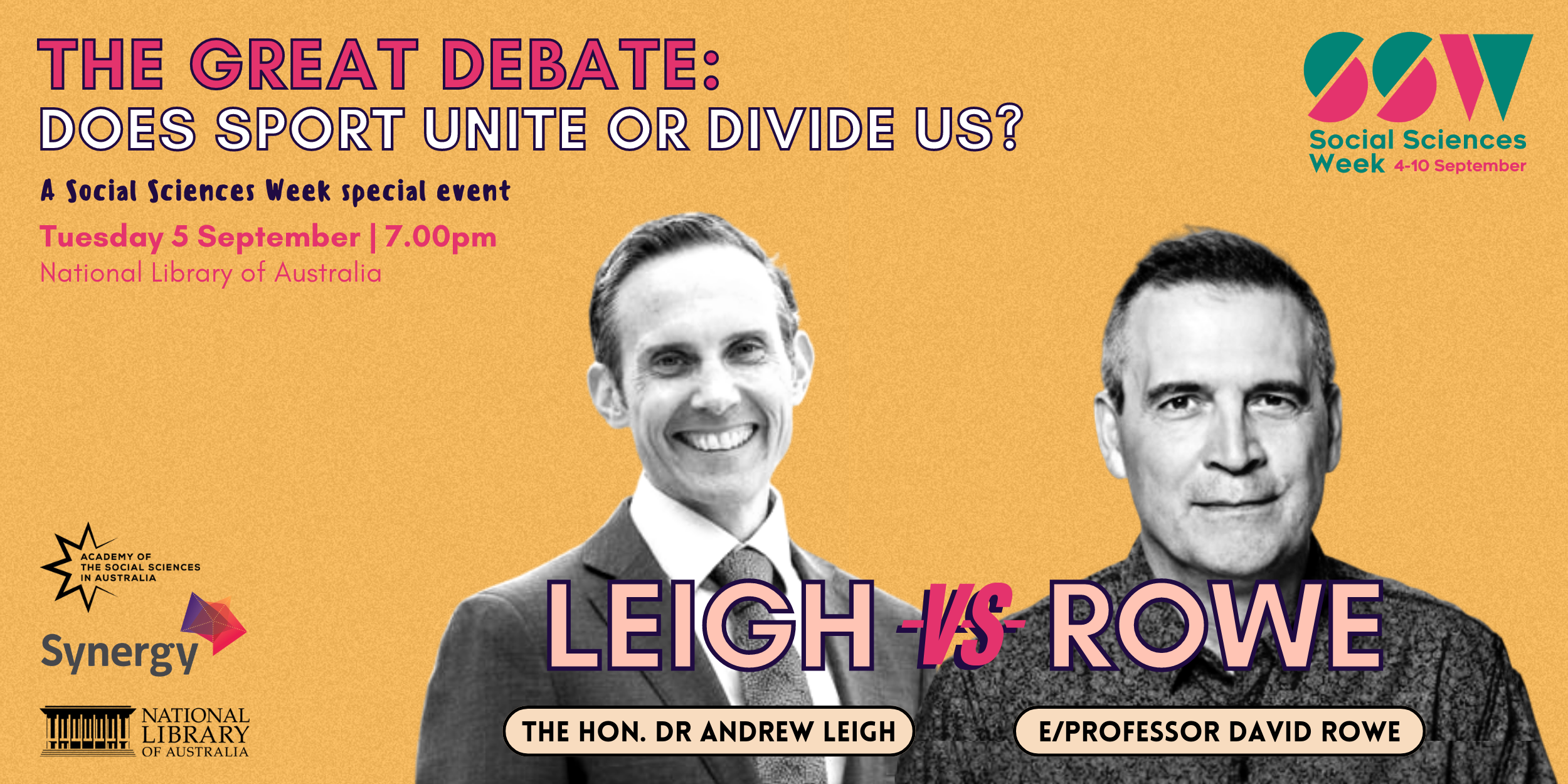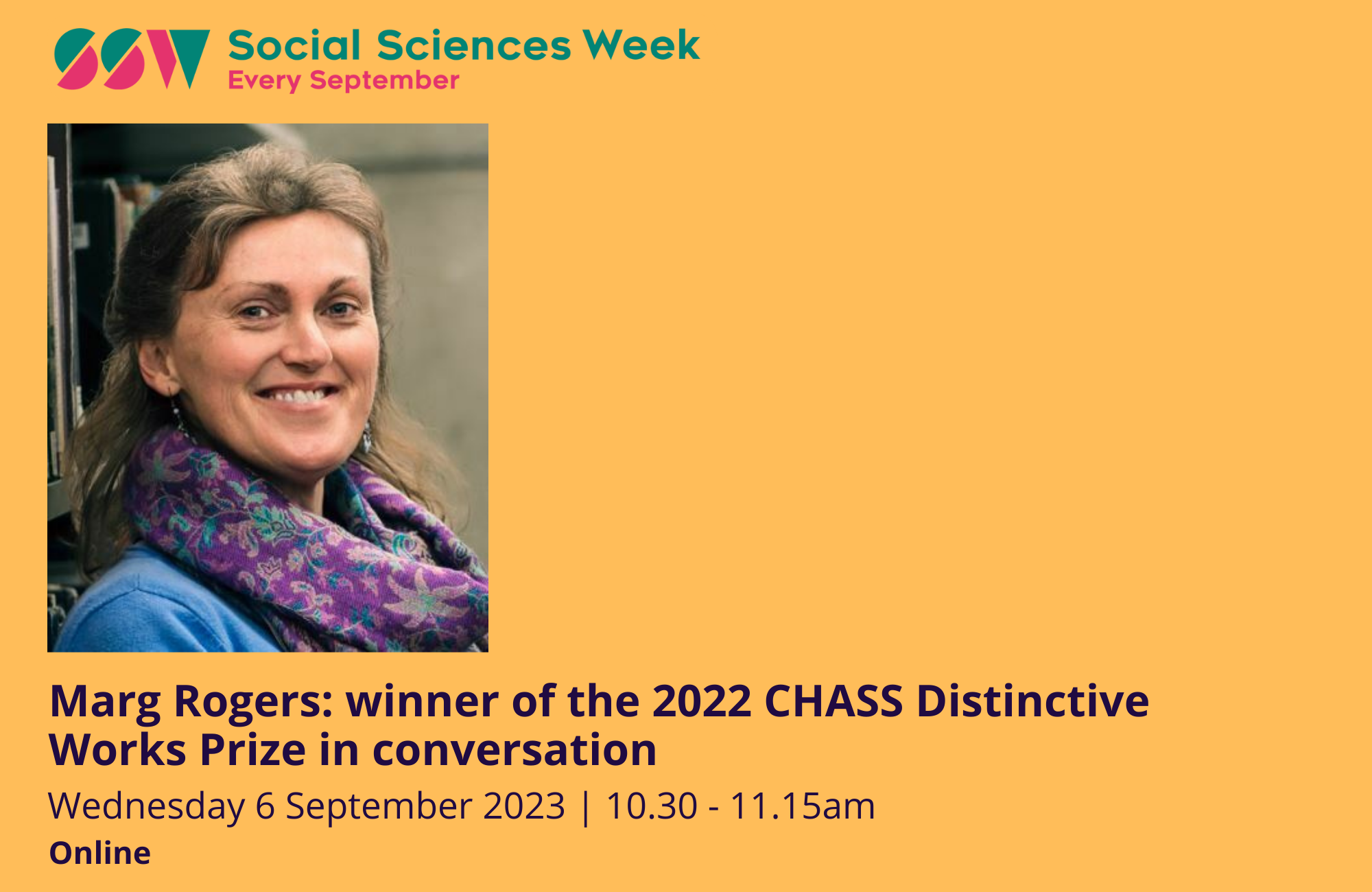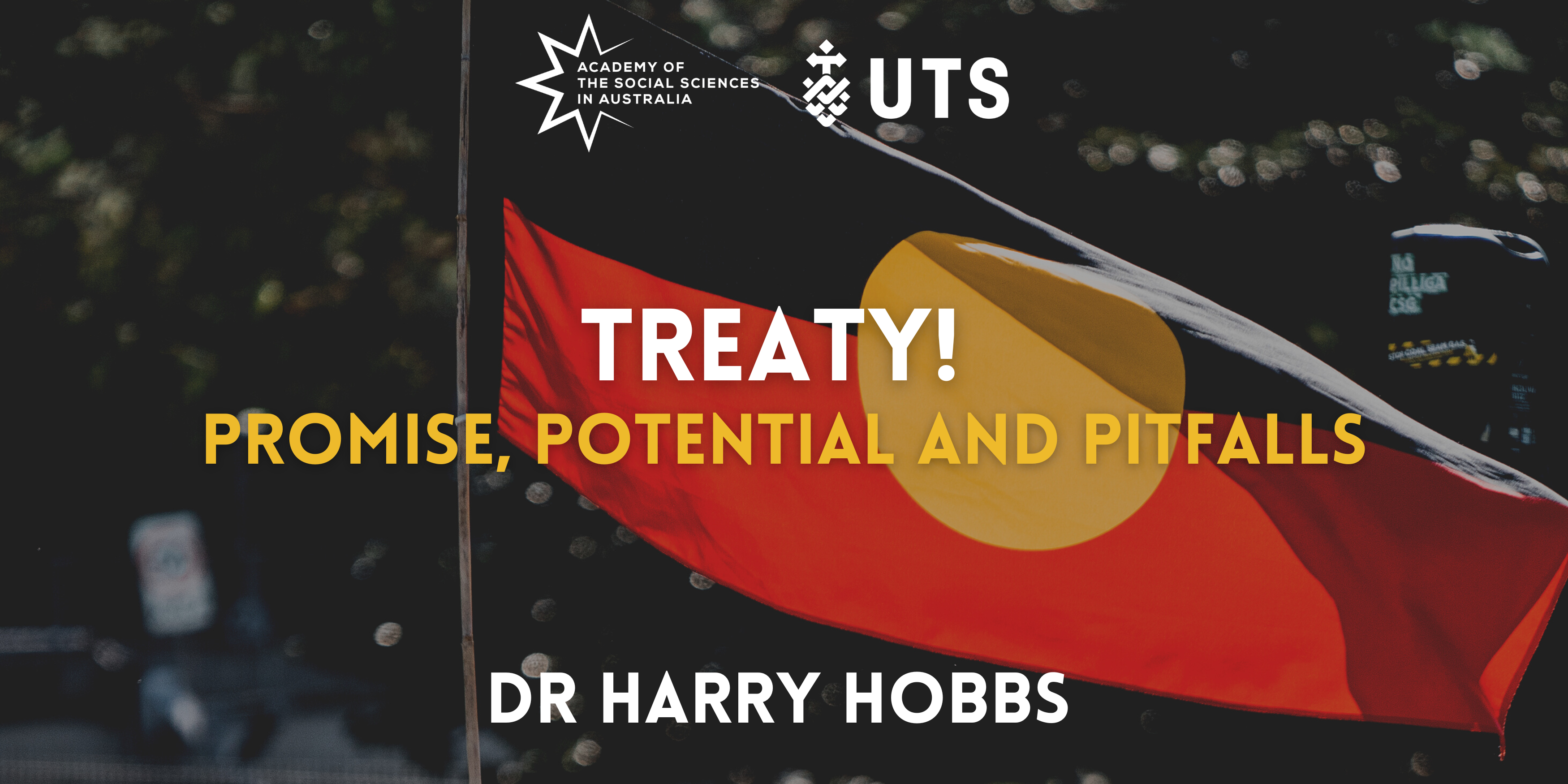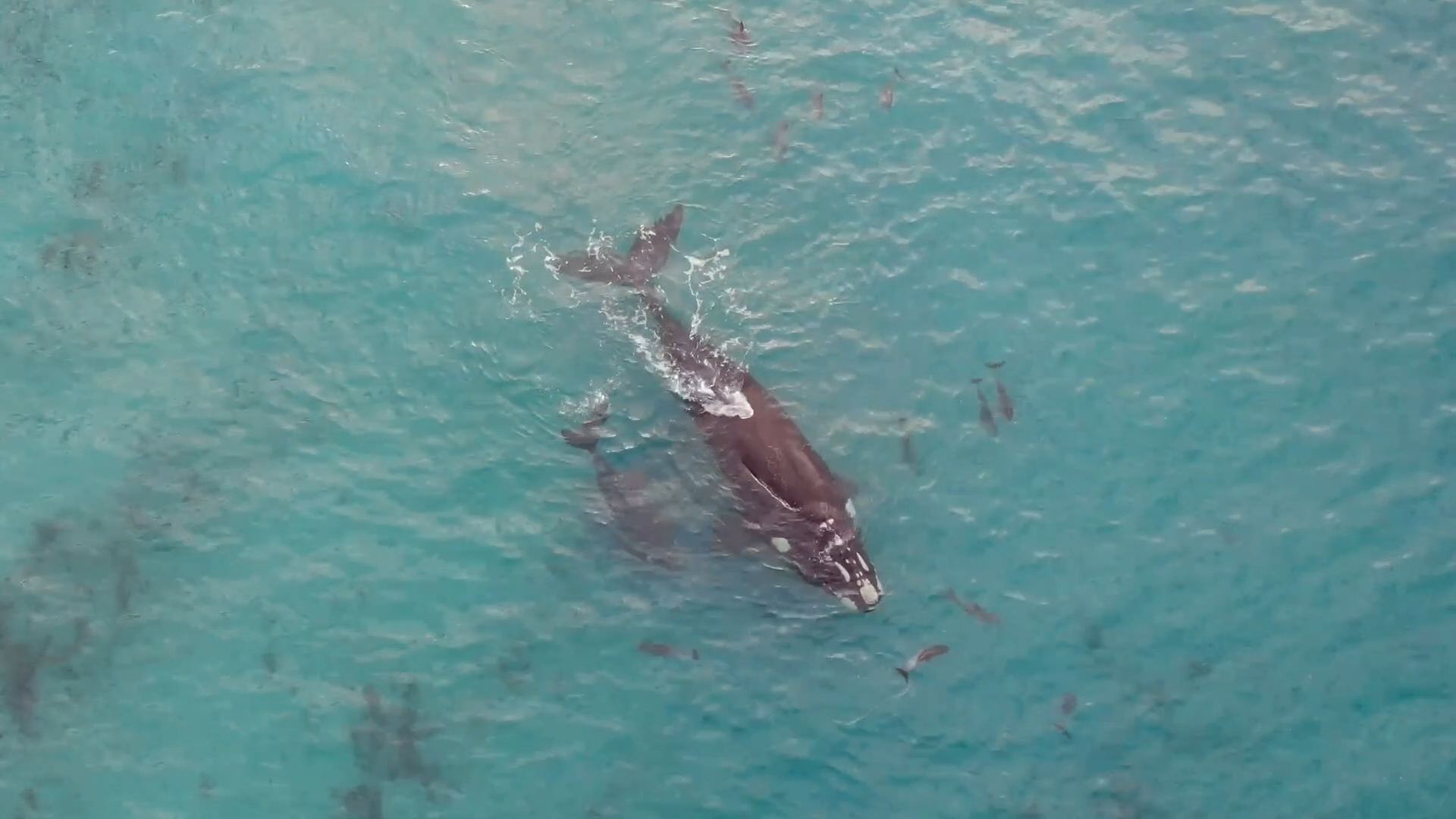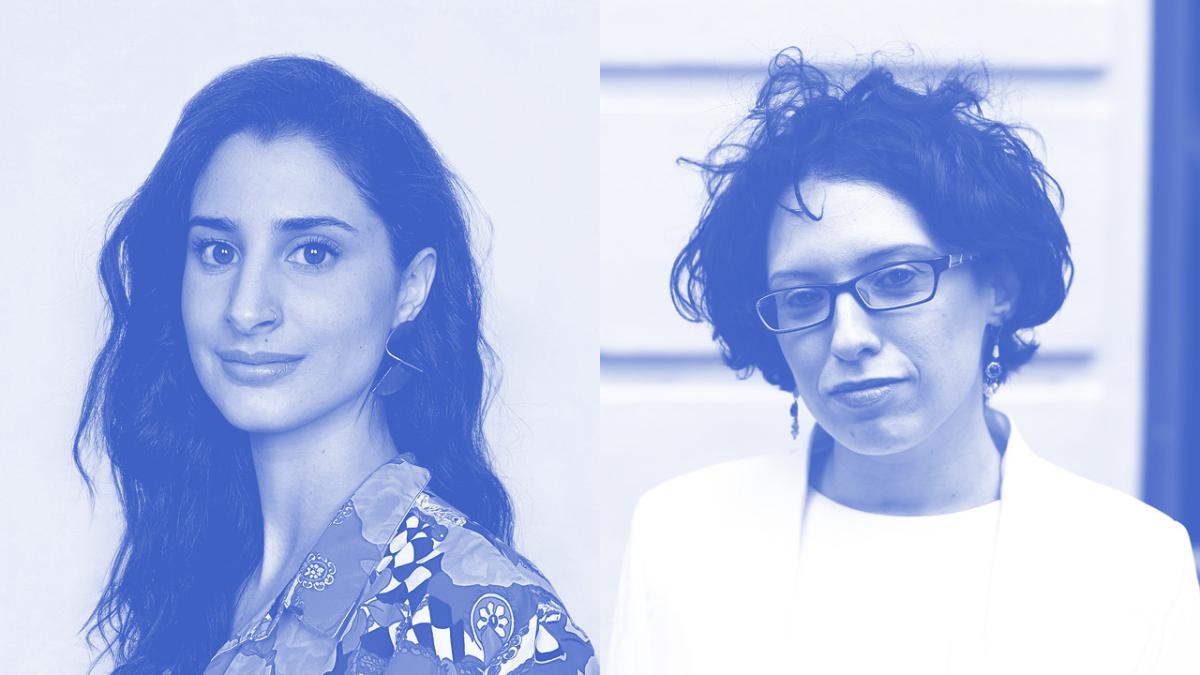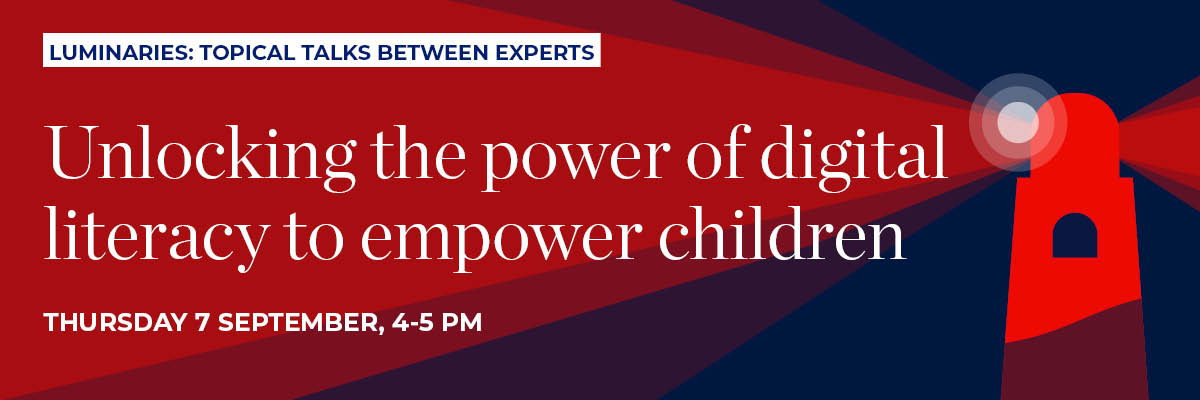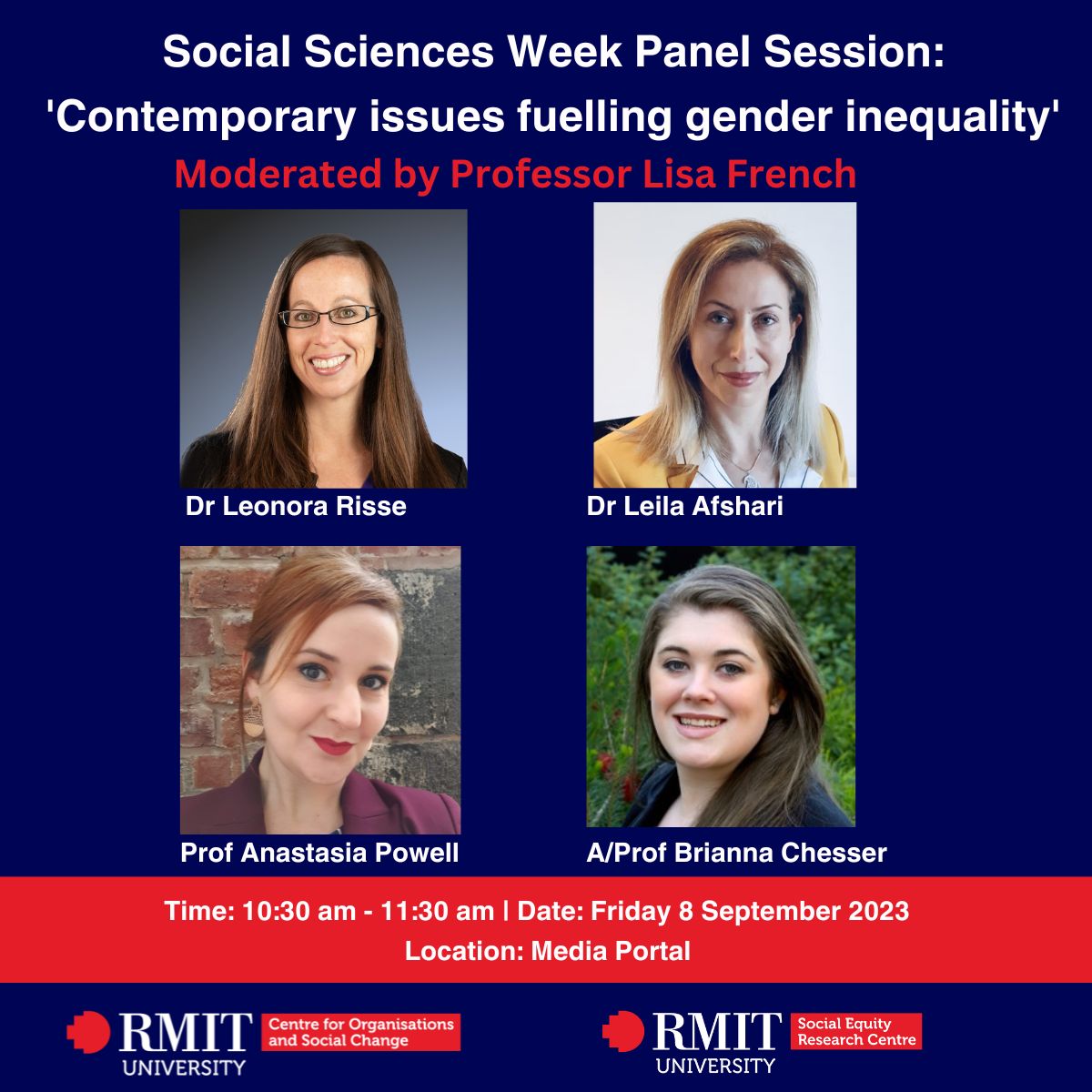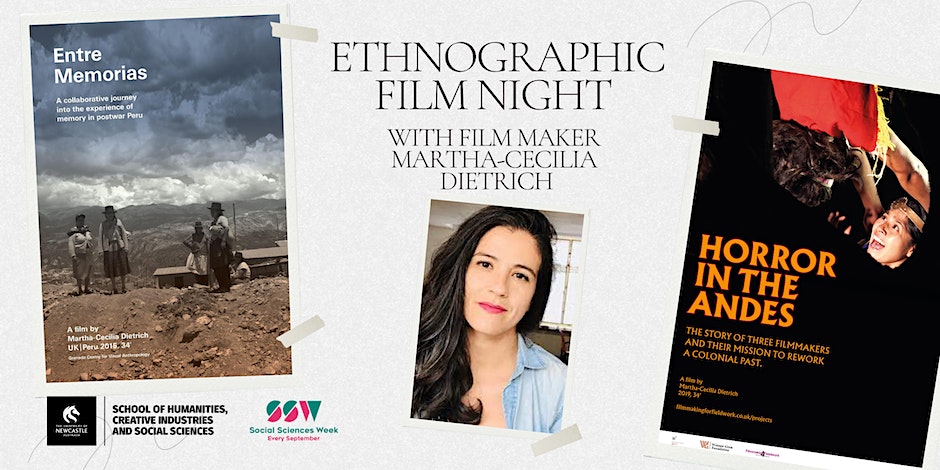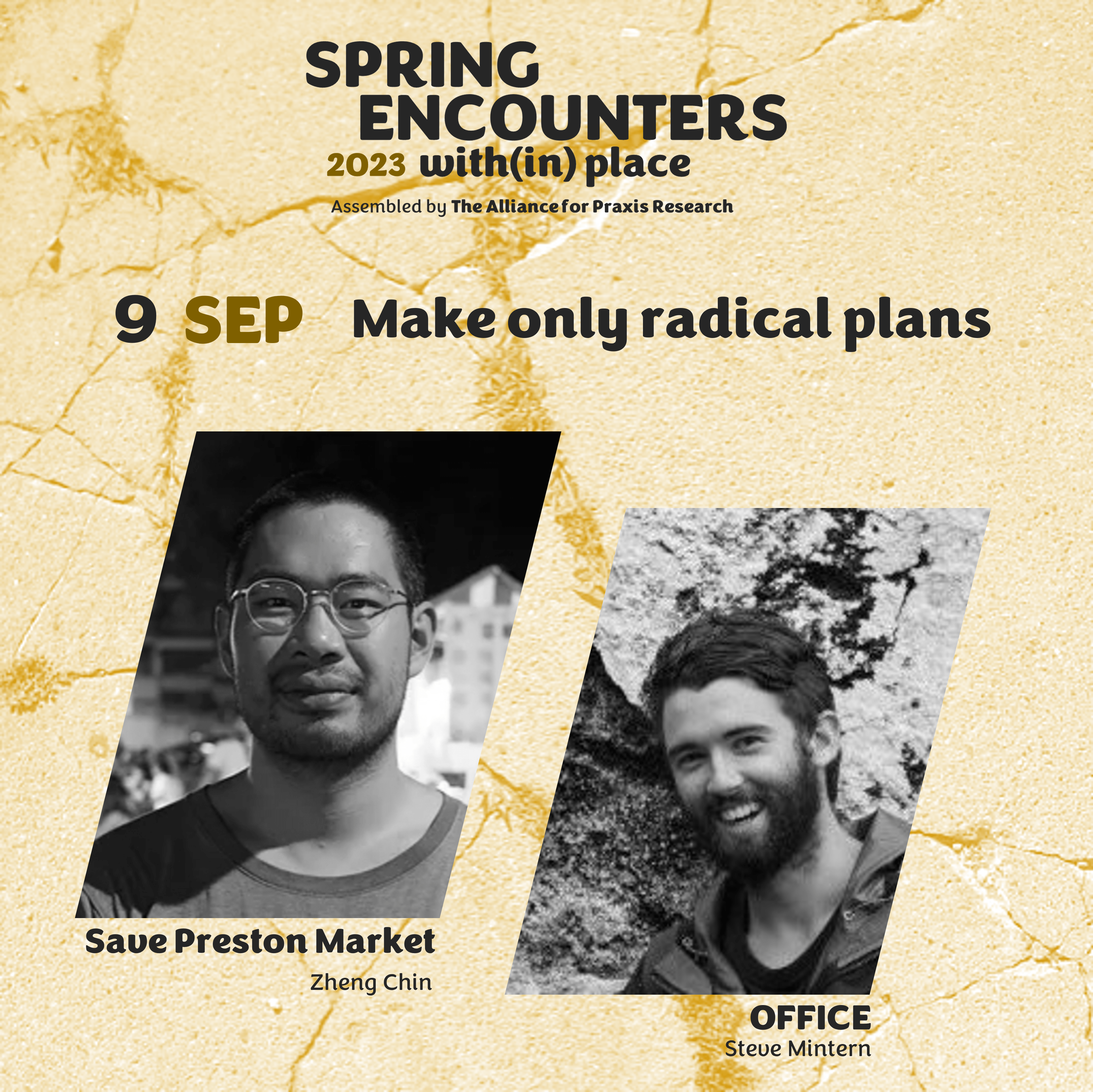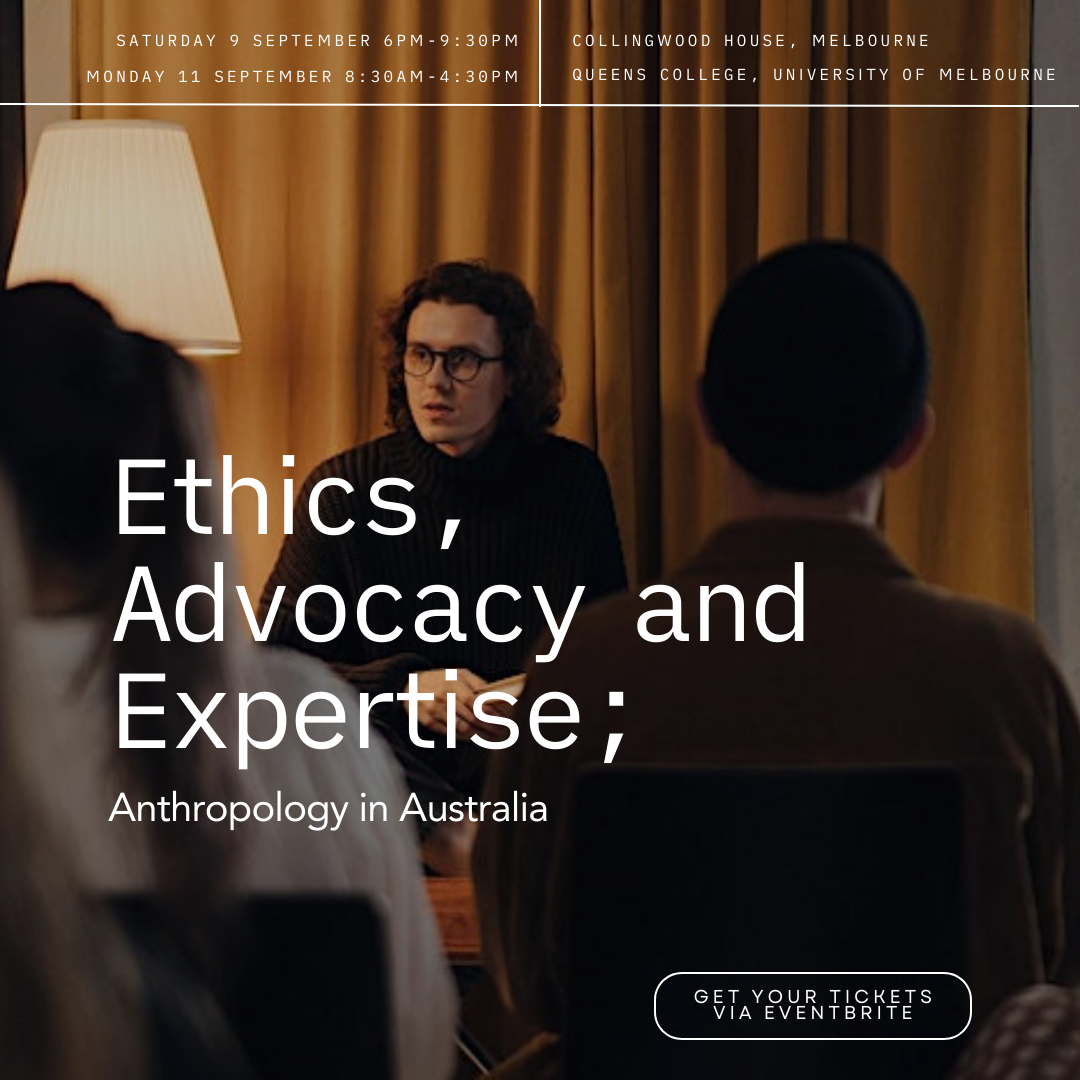Events
- Events
- In Conversation
Supporting Refugee Students in Tertiary Education: A Conversation
Linkway Meeting Room, Level 4, John Medley Building University of Melbourne, ParkvilleThe Palestinian Catastrophe
The Great Hall, Quadrangle (A14), The University of Sydney, University Place.The Great Debate: Does sport unite or divide us?
National Library of Australia Parkes Pl W, Canberrato follow the Old Ways
RMIT Design Hub Gallery Building 100, Victoria Street, Carlton, MelbourneNavigating Two Worlds
Io Myers Studio, Esme Timbery Creative Practice Lab, UNSW Kensington UNSW Sydney, High St, Kensington, SydneyLobbying and Agenda Setting: Whose Interests are Served, How and Why?
Room 650, Social Sciences Building, University of Sydney Science Road, CamperdownThe Next Generation of News
John Niland Scientia Building, UNSW Sydney Leighton Hall - John Niland Scientia Building, University of New South Wales, Gate 11, Library Walk, Kensington Campus, KensingtonContemporary issues fuelling gender inequality
RMIT Media Portal Media Portal, Building 12, 402 Swanston Street, MelbourneMake only radical plans – 2023 Spring Encounters: with(in) place
Bell Train Station (meeting point) Bell St / Garnet St, PrestonEthics, Advocacy and Expertise; Anthropology in Australia
Collingwood House 101 Johnson Street, Collingwood- No events scheduled for 9 September 2023.
Week of Events
Transformative Justice and Peace in Africa
Transformative Justice and Peace in Africa
Join us for one or both of two online seminars exploring transformative justice and peace on the African continent. Session 1: Transformative Justice and the African Union: Unsettling the Dominant Discourse and Practice of Transitional Justice 4 September, 1-2 pm Online only Speaker: Dr Wendy Lambourne, Senior Lecturer in Peace and Conflict Studies, Discipline of Sociology and Criminology, University of Sydney Transitional justice as a field of practice has become standardised around four ‘essential and complementary’ key pillars derived from the Joinet principles against impunity: criminal justice, truth-seeking, reparations and guarantees of non-recurrence/institutional reform. These four key pillars were defined by the United Nations in 2010 as central to supporting transitional justice in countries seeking to build peace at the same time as addressing the legacies of mass human rights violations. I have argued that the imposition of these four pillars as the only model of transitional justice not only undermines the principles of local ownership and contextualisation, it is also incompatible with a process of transformative justice and the ultimate goals of peace and reconciliation. The African Union has subsequently developed a Transitional Justice Policy and Framework for the region that takes a broader, more flexible and localised perspective which is […]
Transformative Justice and Peace in Africa
Transformative Justice and Peace in Africa
Join us for one or both of two online seminars exploring transformative justice and peace on the African continent. Session 1: Transformative Justice and the African Union: Unsettling the Dominant Discourse and Practice of Transitional Justice 4 September, 1-2 pm Online only Speaker: Dr Wendy Lambourne, Senior Lecturer in Peace and Conflict Studies, Discipline of Sociology and Criminology, University of Sydney Transitional justice as a field of practice has become standardised around four ‘essential and complementary’ key pillars derived from the Joinet principles against impunity: criminal justice, truth-seeking, reparations and guarantees of non-recurrence/institutional reform. These four key pillars were defined by the United Nations in 2010 as central to supporting transitional justice in countries seeking to build peace at the same time as addressing the legacies of mass human rights violations. I have argued that the imposition of these four pillars as the only model of transitional justice not only undermines the principles of local ownership and contextualisation, it is also incompatible with a process of transformative justice and the ultimate goals of peace and reconciliation. The African Union has subsequently developed a Transitional Justice Policy and Framework for the region that takes a broader, more flexible and localised perspective which is […]
Supporting Refugee Students in Tertiary Education: A Conversation
Supporting Refugee Students in Tertiary Education: A Conversation
A conversation about gaps of inclusion in universities, and blocks and pathways to tertiary education for students with a refugee background This panel will consider gaps of inclusion in universities and blocks and pathways to tertiary education for current and prospective students with a refugee background. This event also features musician Sayeed Zaman Ibrahim, who will play the Hazaragi Dambora. Panel discussants include: Dr Karen Dunwoodie (Deakin University), Director at Deakin CREATE. She has worked, volunteered, researched and advocated in the refugee sector in Australia for the past 12 years and her research interests include progressing the field of refugee resettlement, principally focussing on career development and the impact access to tertiary education and training may have on the lives on refugees and people seeking asylum. Karen’s research interests extend to investigating why some employers may or may not be actively including people with a refugee background, as part of their employment diversity and inclusion strategies. Ms Lana Formoso, Deputy Mayor of Dandenong City Council and a Dandenong High School teacher. She is a dedicated community leader for her community specially newly arrived migrants and refugees in Southeast Melbourne. She is an SES volunteer and ambassador for MyRoom Children’s Cancer […]
The Palestinian Catastrophe
The Palestinian Catastrophe
Presented by Conversation at the Crossroads in association with the School of Social and Political Sciences, University of Sydney. The Palestinian catastrophe, known as the Nakba, refers to the devastation of the Palestinian homeland in 1948, and with it the displacement of the majority of Palestinian Arabs. The Catastrophe did not end in 1948. 75 years later Palestinian lands remain under occupation. As the dramatic use of military force in recent weeks shows, violence, discrimination and displacement remain the lot of the Palestinians. What is a principled response? Which way for a just peace? What constructive initiatives can Australia and other governments take? What of the UN? Is civil society everywhere ready to assume its responsibilities? The peace of the region and the world beyond hangs in the balance. Keynote Address: The Hon Bob Carr, former Foreign Minister for Australia and NSW’s longest continuously serving premier, is Industry Professor (Business and Climate Change) at University of Technology Sydney (UTS). He previously headed the Australia-China Relations Institute at UTS as Director and Professor of International Relations. Professor Carr is Honorary Professor at Beijing Foreign Studies University; recipient of the RSIS Distinguished Visiting Fellowship from Singapore’s Nanyang Technological University and the Fulbright Distinguished […]
The Great Debate: Does sport unite or divide us?
The Great Debate: Does sport unite or divide us?
A Social Sciences Week special event Tuesday 5 September, 6.00 – 9.00pm AEST National Library of Australia Join us for a lively evening of discussion and debate at the National Library of Australia (NLA) in Canberra as we explore the power of sport to bring us together, or push us apart, alongside a matched exhibition at the NLA. Our esteemed speakers are Academy Fellows and published authors, The Hon Andrew Leigh MP and Emeritus Professor David Rowe who will take the stage to explore this fascinating theme alongside Seriously Social podcast host and journalist Ginger Gorman who will moderate the debate. The Great Sports Debate promises to be a thought-provoking and entertaining event, with opportunities for audience participation and engagement. Ticket includes access to the National Library of Australia's exhibition Grit & Gold: Tales from a Sporting Nation, drinks and canapes followed by the debate at 7pm, followed by Q&A. Proudly brought to you by the Academy of the Social Sciences in Australia and the National Library of Australia, with support from Synergy Group. We are delighted to announce that a portion of the proceeds from ticket sales to the Great Debate will be donated to the Indigenous Literacy Foundation charity in support of Indigenous […]
Marg Rogers: winner of the 2022 CHASS Distinctive Works Prize
Marg Rogers: winner of the 2022 CHASS Distinctive Works Prize
CHASS President in conversation with Marg Rogers, one of the 2022 CHASS Distinctive Works Prize winners: Dr Marg Rogers is a Senior Lecturer in the Early Childhood Education team within the School of Education at the University of New England. Marg researches marginalised voices within families and education especially in regional, rural and remote communities. Specifically, she researches ways to support the wellbeing of military, first responder and remote worker families and early childhood educators. Marg is a Postdoctoral Fellow within the Commonwealth Funded Manna Institute that builds place-based research capacity to improve mental health in regional, rural, and remote Australia. Building Research-based Co-designed and Co-created Supports to Improve the Wellbeing of Young Children from Service Families Australia has over 650,000 First Responders, plus volunteers attending to more extreme and frequent climate emergencies, terrorism, and health emergencies. Additionally, Australia has 60,000 full time Defence personnel and over 496,000 Veterans. The children of these service personnel are affected by the stressors of service family life, including frequent and prolonged parental deployments and frequent relocations. Additionally, the children can experience the secondary transfer of trauma if their parent has a service-related injury of mental health conditions. The literature reveals these children are […]
Treaty! Promise, potential and pitfalls
Treaty! Promise, potential and pitfalls
Join us for this special event, featuring the Paul Bourke Award Winner for Early Career Research, Dr Harry Hobbs as he explores modern treaty-making between Indigenous peoples and governments in Australia. This event will add context to the upcoming referendum, and allow the audience to question whether Australia should go down the treaty path; a path that could lead to political settlements that empower Aboriginal and Torres Strait Islander peoples and address the injustices at the heart of the Australian state. Please submit your questions prior to event at events@uts.edu.au Wed 6th Sep 2023, 5:30 pm - 7:00 pm AEST UTS Great Hall
to follow the Old Ways
to follow the Old Ways
'digging up my place of birth … digging up our Mother Earth … now she has been cut … now she has bled … red...' – Robbie Bundle, 2014 Universal Ark Album 'to follow the Old Way' panel will explore the inextricable connectivity between Aboriginal belonging in Country and Ancestral obligation and responsibility in the stewardship of Country, comprising moornong meerreeng (sky country), meerteeyt meerreeng (sea country) ba meerreeng meerreeng (earth country). The Panel contributors will speak to the resonance of interconnected Being, seeking healing for all Kin. It is an appeal to humanity and a gentle reminder that Indigenous patience has ‘worn thin’ and that listening and learning from Aboriginal Ancestral, cultural and ecological knowledges is imperative in this time of climate and ecological crisis. It is an introduction to potentiality, a possible global manifesto, an ontological journey of discovery towards an urgent planetary commons – in perpetuity, in futurity, for our children’s children’s children. Image: Daryn McKenny – Whale Carer & Aboriginal Drone Pilot Please let us know of any accessibility requirements in your booking.
Navigating Two Worlds
Navigating Two Worlds
Lamisse Hamouda | Lana Tatour In 2018 Egyptian-Australian writer Lamisse Hamouda had moved to Egypt to study when her life was turned upside down. Her father Hazem, on his way to visit her, was arrested by authorities, accused of sympathising with a terrorist organisation, and sent to prison without charge or evidence for 433 days. In an intimate evening of conversation with UNSW Middle East expert Lana Tatour, delve into Lamisse's new book The Shape of Dust, and her experience fighting against the Egyptian prison system as an Australian citizen. Together they’ll unpack what support the Australian Government provides dual citizens abroad (surprisingly minimal), what cultural identity means for individuals stuck between two cultural worlds, and how trauma can fragment memory and bring unexpected challenges to the writing process. This event is presented by the UNSW Centre for Ideas.
Lobbying and Agenda Setting: Whose Interests are Served, How and Why?
Lobbying and Agenda Setting: Whose Interests are Served, How and Why?
Lobbying and advising the government are part of the democratic process. Sometimes the interests being served are clear, yet at others they are hidden. Sometimes stories are told to make the outcomes desired easier to understand, and more likely, while at others the narrative serves to shroud the real outcomes desired and undermine democratic processes. In this presentation, the cases of consultants advising governments and the OECD on tax avoidance and LGBTQ+ lobbying are used to tease out some of these tensions. In the case of the former, the role of the Big Four (PwC, EY, KPMG and Deloitte) is used to illustrate how interests potentially undermine desirable outcomes. In the case of the latter, lobbyists and lobbying were essential in driving desirable change. Moderator: Professor Gaby Ramia Speakers: Associate Professor John Mikler: John is an Associate Professor in the Discipline of Government and International Relations. He researches corporations' relations with states, civil society and international organisations, as well as how they are political actors in their own right. His recent books include The Political Power of Global Corporations (Polity 2018); MNCs in Global Politics: Pathways of Influence (co-edited with Karsten Ronit, Edward Elgar 2020); and Capitalism for All: Realising its Liberal […]
UOW Luminaries: Unlocking the power of digital literacy to empower children
UOW Luminaries: Unlocking the power of digital literacy to empower children
Digital literacy for children is complex; even for our youngest children. The ability to use a range of digital technologies, to critically engage with those technologies, and the texts they offer is important. But so too is developing children’s capacities to react and respond to the digital culture within which they operate. Consider the scenarios; While playing an online game, a child is invited to network with an unfamiliar person. While researching for a school project, a child comes across inaccurate information. A photo is shared via social media; the child has not consented for it to be shared and becomes annoyed when they see it. Drawing from interdisciplinary perspectives the panel will consider the scenarios as they work to embrace the fluidity of the digital age as children use technology in ways that are developmentally and contextually appropriate, literacy rich, and safe. When: Thursday, 7 September, 4-5 pm AEST Where: Online via Zoom - Zoom link to join the webinar will be emailed after registration Panellists: Professor Lisa Kervin is Professor of Education in the Faculty of the Arts, Social Sciences and Humanities at the University of Wollongong (UOW), where she is also Director of Early Start Research. Associate Professor Jessica Mantei is Deputy Head […]
The Next Generation of News
The Next Generation of News
Sam Koslowski | Zara Seidler The way we consume news is changing and traditional media is struggling to keep up with our forever online lifestyles. The Daily Aus is changing that – and fast. With unstoppable co-founders Sam Koslowski and Zara Seidler at the helm, The Daily Aus has cracked the code on resonating with young people, distilling the big news stories of the day into accessible, bite sized pieces. From fearless journalists to savvy entrepreneurs, witness the rise of a new generation that's leaving a lasting imprint. Join Zara and Sam as they unpack the big business of youth-focused news, and reveal how digital platforms are transforming the news landscape. Sam Koslowski and Zara Seidler’s new book No Silly Questions: The Daily Aus explains how the world works (and why you should care) is out on Sept 5. You can pre-order the book here.
Contemporary issues fuelling gender inequality
Contemporary issues fuelling gender inequality
The Centre for Social Organisations and Change (COSC) and the Social Equity Research Centre (SERC) at RMIT University invite you to a panel discussion examining contemporary issues fuelling gender inequality as part of Social Sciences Week. Moderated by Professor Lisa French, the panel discussion covers topics ranging from gender gaps in the workforce, career development for women in male-dominated sectors and sexual and family violence against women. The panel features leading scholars: Dr Leonora Risse (COSC), Dr Leila Afshari (COSC), Professor Anastasia Powell (SERC) and Associate Professor Brianna Chesser (SERC). Please join us for a thought-provoking discussion and analysis of gender inequality taking in the social sciences of economics, management and criminology.
Ethnographic Film Night: Horror in the Andes – Between Memories
Ethnographic Film Night: Horror in the Andes – Between Memories
This year’s Social Science Week Ethnographic Film night will feature two short movies: Horror in the Andes and Between Memories by Martha-Cecilia Dietrich. These films present parts of Dietrich’s work in Peru, where, for almost a decade, she has explored the questions of how people create worlds for themselves after violent conflicts and how stories are told about violence and trauma. Horror in the Andes (2020) is a behind-the-scenes documentary that follows the process of making a horror movie in Ayacucho, Peru. In this film, Dietrich explores how Andean filmmakers use the horror genre as a means to revive stories of a pre-colonial past. Appropriating a global cinematic language to tell local (hi)stories, Horror in the Andes pays testament to the craft of filmmaking and its community. Between Memories (2015) is an exploration of the practices of remembering in the shadow of the complex legacies of twenty years of violence and war. In three audio-visual pieces made in collaboration with relatives of the disappeared, insurgents of the Tupac Amaru Revolutionary Movement (MRTA) and members of the Armed Forces, this documentary creates an on-screen dialogue between memories, which in practice remains elusive. The screening of the two films will begin at […]
Make only radical plans – 2023 Spring Encounters: with(in) place
Make only radical plans – 2023 Spring Encounters: with(in) place
“2023 Spring Encounters: with(in) place” is series of activities organised by the Alliance for Praxis Research (APR), composed by artists, researchers and PhD candidates from Monash and RMIT. Spring Encounters provides a platform for researchers, activists and artists to connect in a relaxed setting of informal conversations and action. Its purpose is to break the boundaries of disciplines and institutions, creating cracks for open dialogue and the sprouting of ideas. Our program this year will be hosted in different locations across Melbourne. This year, we've designed these gatherings as a means to nurture our connections with place and, simultaneously, to highlight initiatives that are collaboratively shaping communities across Melbourne. From Preston Market to the Catalyst Social Centre, we hope that by the end of this journey, we will be able to entangle relationships, cultivate care, ground ourselves, and reimagine our work and lives with(in) place. 09 September | Make only radical plans Meeting at Bell station | 10 to 12 pm Facilitated by Zheng Chin (APR/Monash University) + TBA Radical planning questions existing power structures to prioritise social justice, sustainability, and community empowerment. By reimagining urban spaces and engaging in social transformation, radical communities seek to create more equitable and […]
Ethics, Advocacy and Expertise; Anthropology in Australia
Ethics, Advocacy and Expertise; Anthropology in Australia
With a passion to work more collaboratively, Anthroprospective and the Centre for Native Title Anthropology are teaming up to host two engaging events this September during Social Science Week in Melbourne as a way of encouraging social science academics to engage in more authentic dialogue with the broader public. In doing so, we hope that we can create new avenues to promote the applicability and significance of social science to more mainstream audiences. The first event will be held on Saturday September the 9th from 6pm to 9:30pm in Collingwood at 'Collingwood House'. This social networking evening will comprise of two keynote speeches and an engaging Q&A panel centralised around the theme of 'Ethics, Advocacy and Expertise; Anthropology in Australia'. For further information and to book your tickets, please see: https://www.eventbrite.com.au/e/ethics-advocacy-and-expertise-anthropology-in-australia-tickets-645809582847 The second event will be held on Monday September the 11th from 8:30am to 4:30pm at Queens College, The University of Melbourne. In keeping with the theme of 'Ethics, Advocacy and Expertise; Anthropology in Australia', this all-day conference workshop which will provide attendees the opportunity to continue discussions from the previous Saturday night and to delve into a number of stimulating topics from a range of anthropologists. For further information and to register your attendance at this free offering, please see: https://www.eventbrite.com.au/e/ethics-expertise-and-advocacy-one-day-cnta-workshop-tickets-674978086627?aff=erelexpmlt We […]

